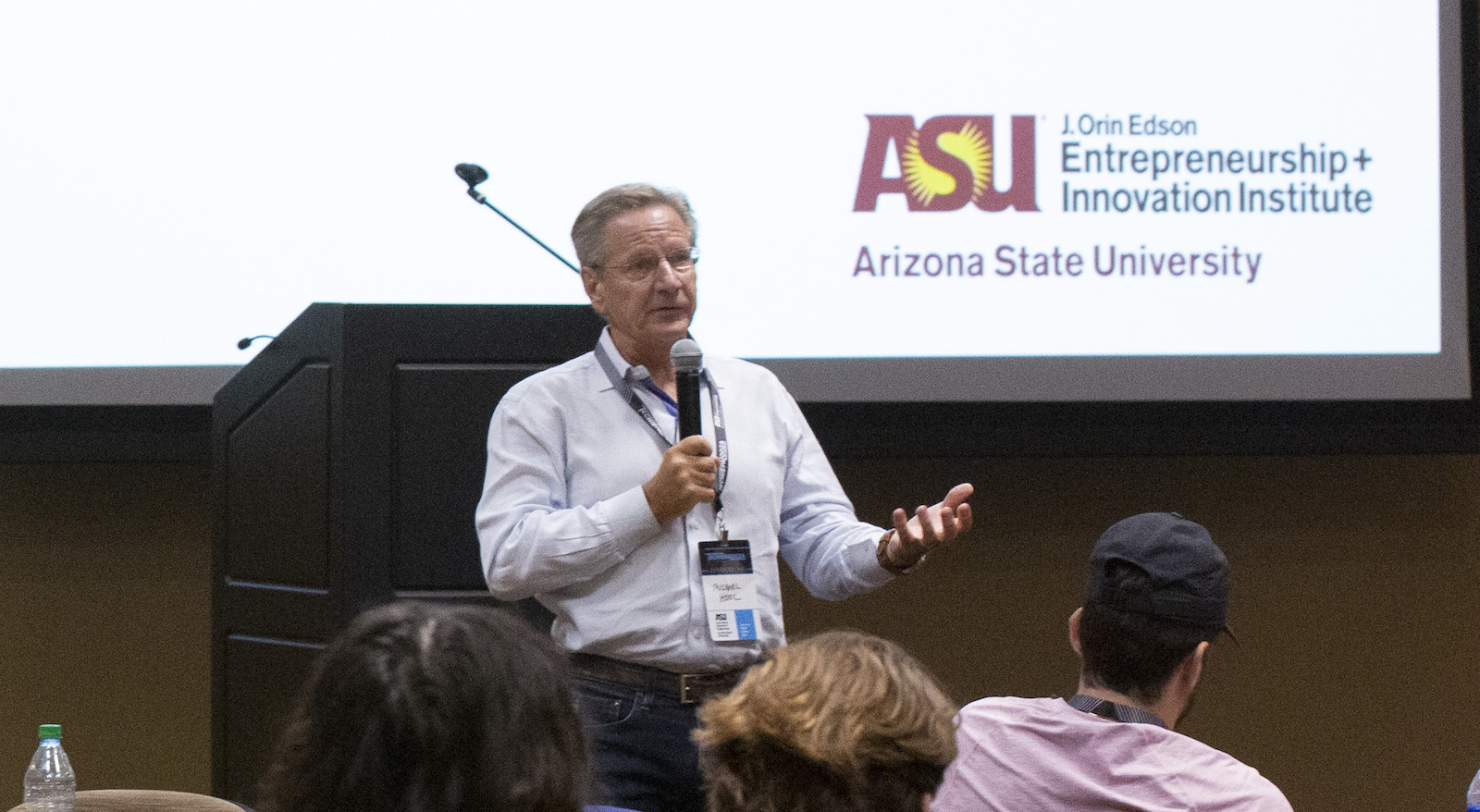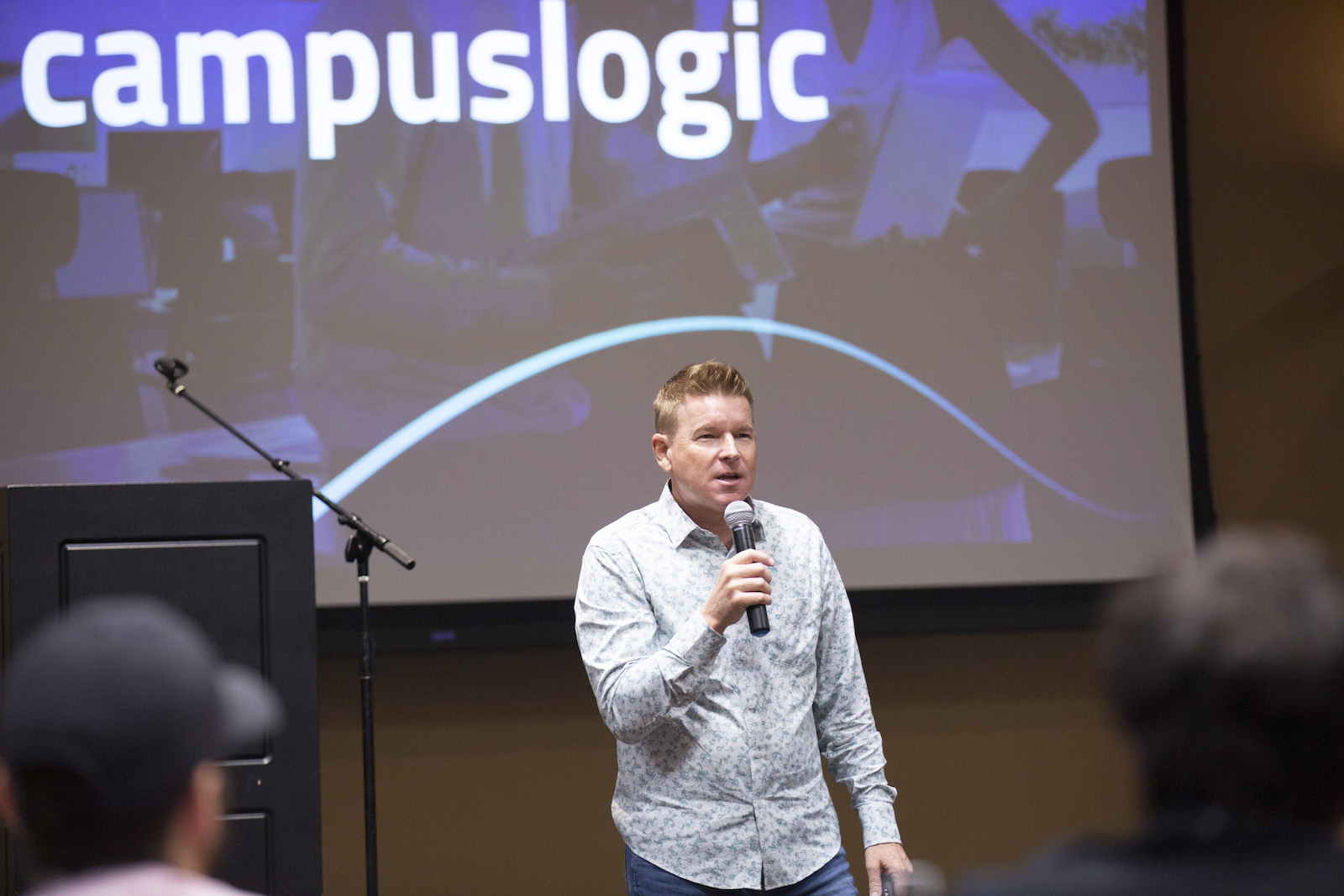Entrepreneurial minds collide at Techiepalooza

Electrical engineering sophomore Chanese Smith introduced herself as an entrepreneurially minded techie during the 2021 Techiepalooza. The event gave venture founders opportunities to connect with techies looking to lend their technology skill to help support ASU-based entrepreneurial ventures. Photo by Erika Gronek/ASU
For many students in the Ira A. Fulton Schools of Engineering and across Arizona State University, entrepreneurial thinking is more than a skill, it’s a mindset. Creating innovative solutions to challenges is part of the entrepreneurial spirit embraced by many in the ASU community, where being innovative is a source of pride.
Entrepreneurship + Innovation @ Fulton serves as a connection and collaboration resource for entrepreneurs at all stages and offers a wealth of opportunities to learn about entrepreneurship and innovation both in the classroom and beyond.
One of those opportunities is Techiepalooza, a networking mixer held at ASU and sponsored by Hool Coury Law. At the 2021 event, founders of startup ventures across the Valley were able to reach out to the ASU community of “techies” to help fill the roles needed to make their ventures successful.
Kyle Squires, dean of Fulton Schools and vice provost of engineering, computing and technology at ASU, opened the event by reminding attendees that the ASU community is here to support, engage and foster a welcoming environment to explore new ideas.
“I want to reinforce the value of entrepreneurship and impact of the entrepreneurial mindset at ASU and the Fulton Schools,” Squires said. “Your idea might become an actual venture that leads to the formation of a company. However, even if that ends up not happening, the process of thinking and planning how your idea can make the most impact, where you can take it and what you need to do in order to continuously refine, shape and improve that idea will serve you very well.”
Techiepalooza traces its roots to a 2012 event of the same name that was designed to bring together the growing community of techies and entrepreneurs in the Phoenix area. Some of the ASU students, alumni and community members who participated then were among those at the recent event.
Michael Hool, founder and managing partner of Hool Coury Law, as well as an associate professor in ASU’s Sandra Day O’Connor College of Law, was involved in the original event and wouldn’t have missed the opportunity to reinvigorate it. The event, he says, offers value by bringing entrepreneurially minded engineering and business students together to network and learn how they can help each other in the startup space.
“There are engineering startups and then there are business school startups. The business school startups might be a little light on the tech, and the engineers may not know much about business,” Hool said. “We’ve got these great schools here at ASU, so we wanted to give them an opportunity to collide and form some teams and create some great companies with a lot more chances of success.”

Michael Hool, founder and managing partner of Hool Coury Law, speaks at Techiepalooza about his vision to bring together startup founders with techies to help build successful startup ventures at ASU. Photo by Erika Gronek/ASU
Five lessons for techies
Gregg Scoresby, the CEO and chairman of CampusLogic, gave the keynote address at Techiepalooza, outlining five lessons he has learned in his time building software products.
- Have a clear vision. When building a company, innovators should be clear on the goals they want to achieve. He noted that visions can change, but it’s important to know what really resonates with people and recognize why you care about the solution you’re offering. “Having a clear vision about how you want to change the world is actually more important initially than the actual product you build,” Scoresby said. “That’s what allows you to attract other people to that vision.”
- Have the right tools. Scoresby admitted that this was an area he struggled with early on in his entrepreneurial journey. “Part of having the right tools means not building what you don’t have to build,” he said. “Sometimes you can spend a lot of time and resources building something that you could get off the shelf and plug in to. I made a bunch of mistakes around the wrong tools. Be thoughtful about tools and ask other people that have built companies how they found what works.”
- Choose your team wisely. Scoresby’s third lesson is to have the right people. An example he gave: If you need an electrician, don’t go out and recruit a plumber. In his experience, Scoresby said, companies do two things, build products and sell products. “If you’ve already got a bunch of people who can build, maybe you need someone who can actually get your product out to the market. Make sure early on you get the right people, who in turn will help you get the right tools.”
- Get it out into the wild. Scoresby’s advice is to get your company and product out there as early as you can to get feedback. The first version of a product is not going to be perfect, and getting feedback early will prevent you from further developing something that doesn’t work for the consumer. “You got to get it out there so people can give you feedback,” Scoresby said. “Then you can say, ‘I have to refine this, I have to fix this, I have to make this better.’ You need to have the confidence and courage to do that, but get it out there sooner rather than later.”
- Recognize there are always problems to solve. The final lesson Scoresby shared came from the movie “The Martian,” which he says is possibly the best commentary on startups he has ever seen. When starting a new venture, “it’s just one problem after another, but that can be really engaging, really motivating and, for the right people, can also be inspiring,” he said. “That is a key lesson for product and company success.”
Scoresby gave words of encouragement to the roomful of students looking to build their techie futures in startups.
“I think we get some of these pieces a little bit wrong here and there,” he said. “We need to have a really big vision, but we don’t need to let the vision take over. When just getting started, start small, and then move fast and learn as you go.”

Gregg Scoresby, CEO and chairman of CampusLogic, gives a Techiepalooza keynote address in which he outlined five lessons for entrepreneurially minded students and startup founders to follow. Photo by Erika Gronek/ASU
Startups succeed when worlds collide
The final session of Techiepalooza enabled the startup founders to introduce their companies and products to techies seeking to lend their expertise to the founders. Hool envisioned this integration of founders and techies as two worlds “colliding.”
One of those founders was Andrew Deros, a mechanical engineering senior in the School for Engineering of Matter, Transport and Energy, one of the seven Fulton Schools, and a junior industrial design student in ASU’s Herberger Institute for Design and the Arts. His company, Memory Glass, focuses on helping patients with Alzheimer’s disease recognize people they can’t remember.
“Our hope with this device is to reconnect the world,” Deros said. “Today, I’m really here because we’ve got the hardware side handled, but our software is lacking, and I could really use some help on that end.”
When he learned about the event, Deros knew it would provide an opportunity to find the right people to help his business.
“I came to Techiepalooza to try to create something because we have all the creative freedom in the world,” he said.
Some students in the room attended in hopes of finding ventures that needed their particular skill sets. One of those techies was Chanese Smith, a second-year electrical engineering in the School of Electrical, Computer and Energy Engineering, one of the Fulton Schools. She attended the event to meet entrepreneurs and network with other techies.
“Those two worlds colliding is the best of both worlds for me right now,” Smith said. “I’m all about entrepreneurship and being a technical person.”
Smith designs websites and marketing material for companies and wants to use her skills to help startup ventures.
“I’m hoping to match with a great company that’s a good fit, where I can help them in their endeavors and be an asset to them to the best of my ability,” Smith said. “I’m looking forward to meeting more people and seeing what all the companies are about.”
Have you heard of Venture Devils?
Venture Devils is a program in Arizona State University’s J. Orin Edson Entrepreneurship + Innovation Institute that strives to put startup founders on the road to entrepreneurial success by connecting them with venture mentors who provide regular, ongoing support. The program is designed to challenge, monitor and advance the venture development process.
“Venture Devils is your one-stop shop for all things related to entrepreneurship at ASU,” said Brittany Martin, the senior program manager and a speaker at the 2021 Techiepalooza event.
“We support students, staff, faculty and alumni ventures, and we currently have over 700 (students) in the program,” Martin said. “We grow every year, and we have continual applications for funding that goes throughout the year.”
Venture Devils applications are accepted and processed five times per year, coinciding with the fall A and B, spring A and B, and summer C session start dates. The Venture Devils Program aims to engage, mentor and fund founders who are actively working toward solving problems.
To learn more about Venture Devils, visit the program’s website.
More Science and technology

Science meets play: ASU researcher makes developmental science hands-on for families
On a Friday morning at the Edna Vihel Arts Center in Tempe, toddlers dip paint brushes into bright colors, decorating paper…

ASU water polo player defends the goal — and our data
Marie Rudasics is the last line of defense.Six players advance across the pool with a single objective in mind: making sure that…

Diagnosing data corruption
You are in your doctor’s office for your annual physical and you notice the change. This year, your doctor no longer has your…

